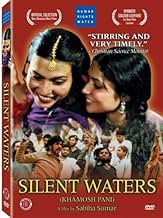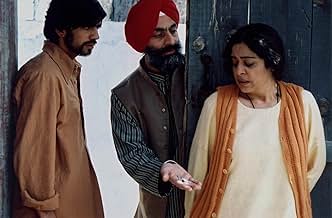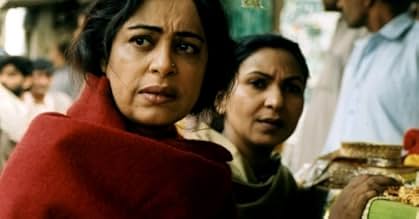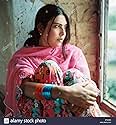IMDb रेटिंग
7.5/10
1.3 हज़ार
आपकी रेटिंग
अपनी भाषा में प्लॉट जोड़ें1979. A village in Pakistan. A widow sees her 17 years old son being attracted to Islamist militants. It brings her past back.1979. A village in Pakistan. A widow sees her 17 years old son being attracted to Islamist militants. It brings her past back.1979. A village in Pakistan. A widow sees her 17 years old son being attracted to Islamist militants. It brings her past back.
- पुरस्कार
- 8 जीत और कुल 2 नामांकन
Aamir Ali Malik
- Saleem
- (as Aamir Malik)
Navtej Singh Johar
- Jaswant
- (as Navtej Johar)
Arshad Mahmood
- Mehboob
- (as Arsad Mahmud)
Fareeha Jabeen
- Shabnam
- (as Fariha Jabeen)
फ़ीचर्ड समीक्षाएं
I am at a loss of words after watching this one which is more than a film, it is an experience therefore, the only words in which this masterpiece can be described are adjectives-mind blowing, shocking, great in narrative and style, simple and subtle, poignant, brilliant exposition. Here is finally a movie, that shocks you, surprises you, questions you, slaps you, make you cry, shows you a mirror-to sum up evoke strong responses. The film finally succeeds in speaking a universal language. Here No sides are taken but just roots you to the middle of the premise. It touched the epic proportions of earlier masterpieces Garam Hawa and Tamas, based on partition issues. Though an influence of Iranian new wave cinema is seen on film maker sabiha sumer yet it is an original piece. A superior product, a touching tale, a classic world cinema, indeed.. "Jinhe naaz hai Black par wo kahan hain".
This is an outstanding movie, illustrating life in rural Punjab in Pakistan and how the ugly scepter of religious fundamentalism raises its head and disrupts the peaceful flow of village life under General Zia. At the every end, it refers to the current version of an old story under yet another General, Musharaf.
The central story is about Ayesha, a Sikh girl abducted and left behind during the Partition, who has made a new life for herself in Pakistan, being forced to take on a new identity, marrying one of her abductors, and raising a son she dotes upon. The return of her long lost brother as a pilgrim and the taking over of the village by fanatics ends up destroying the life she had created. Kirron Kher in the lead role is very good and all the actors do a great job.
My only concern is that viewers without a close understanding of the India Pakistan Partition may miss out some of the subtleties. That however did not stop the judges at a European film festival from awarding the best actress prize to Kirron Kher.
The central story is about Ayesha, a Sikh girl abducted and left behind during the Partition, who has made a new life for herself in Pakistan, being forced to take on a new identity, marrying one of her abductors, and raising a son she dotes upon. The return of her long lost brother as a pilgrim and the taking over of the village by fanatics ends up destroying the life she had created. Kirron Kher in the lead role is very good and all the actors do a great job.
My only concern is that viewers without a close understanding of the India Pakistan Partition may miss out some of the subtleties. That however did not stop the judges at a European film festival from awarding the best actress prize to Kirron Kher.
Its easier to stand on the present day and judge the event on the basis of right and wrong (of course staying within the limits of being politically correct). Khamosh Paani does a bit more than that. It goes back in time and attempts to point at the situations/ circumstances/ events where the seeds of terrorism & fundamentalism were sown by wily politicians in the garb of uniting the people to cleanse the nation. Khamosh Paani is an introspection and references to the Godzilla staring at everyones face today. Through the character of Veero/ Ayesha the director attempts to give a message that history is bound to repeat itself when the path of extremism is chosen.
Kiron Kher: Veero/ Ayesha has seen it before and its almost like a a deja vu should her son chooses to tread the path. The pain and anguish of the mother, yet being resilient to hold back the truth is well portrayed.
Aamir Ali Malik: He does a good job of donning various caps from a headless "lover-boy" chicken, metamorphosing into a purpose-filled jihaadi youth.
Shilpa Shukla: It took me a while to recollect this "Chak De" girl. Her character was merely "used" to show the ideology change in Saleem owing to which the there isn't much meat.
The built up of the events and narrative deserves brownie points. The prosake village life where everybody is living harmoniously like a family is depicted well and the initiation of the snail-paced transformation.
Sabiha Sumar has a story to tell and it does come with a bitter pill, therefore the viewpoint is open to debate. And the barrage of pot calling the kettle black starts - NOW!
Kiron Kher: Veero/ Ayesha has seen it before and its almost like a a deja vu should her son chooses to tread the path. The pain and anguish of the mother, yet being resilient to hold back the truth is well portrayed.
Aamir Ali Malik: He does a good job of donning various caps from a headless "lover-boy" chicken, metamorphosing into a purpose-filled jihaadi youth.
Shilpa Shukla: It took me a while to recollect this "Chak De" girl. Her character was merely "used" to show the ideology change in Saleem owing to which the there isn't much meat.
The built up of the events and narrative deserves brownie points. The prosake village life where everybody is living harmoniously like a family is depicted well and the initiation of the snail-paced transformation.
Sabiha Sumar has a story to tell and it does come with a bitter pill, therefore the viewpoint is open to debate. And the barrage of pot calling the kettle black starts - NOW!
Perhaps the first south Asian film that has had such a lasting impression on me, Khamosh Pani has hardly received the glory it truly deserves. Watching the film leaves you senseless for about half an hour and then it knocks all the wind out of you.
Khamosh Pani takes the viewer to a small village in Pakistan where life evolves. Specifically it focuses on Ayesha and her son Saleem and their relationship. Ayesha never goes to the village well to draw water while Saleem gets seduced by Islamic fundamentalists and transforms from a love sick puppy to the man he thinks he wants to be.
Sabiha Sumar, perhaps one of the best directors in the subcontinent, tells us the story of a small village in Pakistan. With perhaps one of the most powerful issues to deal with, Sumar displays true genius by making everything seem so subtle and hauntingly real. Perhaps, the greatest strength lies in convincing the audience that the statement need not be made in black and white and in this respect Sumar shines.
To say that the acting performances were excellent would be the understatement of the century. One watches in amazement at how real and authentic each character is. The mind knows that what it sees are actors and yet it refuses to believe what it knows. Every single character, from an extra to the leads adds to the tremendous energy that the film brings with it. Kirron Kher as Ayesha/Veero is stunning, so much so that one cannot imagine her as anyone else. Aamir Ali Malik is another actor who plays with the audience, seducing them and disturbing them through the course of the film As an Indian separated from the partition by two generations I can't really say that I feel the pain that my mother does when she sees a film such as this, I have heard stories of my grand aunt who was attacked and mutilated by a mob in Lahore when my mothers family had to leave for India. Perhaps my lack of sentimental attachment makes me see it a little more objectively. Khamosh Pani has exposed me to some of this pain and while it may not be my own I can feel it. But the question that arose in my mind is that those that were around when this bloodshed (on both sides) occurred have mostly died or are dying, will we succeeding generations ever know this pain? The pain of leaving behind a wife, killing your own daughter, leaving her to be raped, Living in another country when that which was once a part of you lives somewhere else. How can I fight for this when I don't know what its like? Khamosh Pani made me feel this pain for a few days; perhaps we need more reminders such as these so that we can experience the pain to forget.
Khamosh Pani takes the viewer to a small village in Pakistan where life evolves. Specifically it focuses on Ayesha and her son Saleem and their relationship. Ayesha never goes to the village well to draw water while Saleem gets seduced by Islamic fundamentalists and transforms from a love sick puppy to the man he thinks he wants to be.
Sabiha Sumar, perhaps one of the best directors in the subcontinent, tells us the story of a small village in Pakistan. With perhaps one of the most powerful issues to deal with, Sumar displays true genius by making everything seem so subtle and hauntingly real. Perhaps, the greatest strength lies in convincing the audience that the statement need not be made in black and white and in this respect Sumar shines.
To say that the acting performances were excellent would be the understatement of the century. One watches in amazement at how real and authentic each character is. The mind knows that what it sees are actors and yet it refuses to believe what it knows. Every single character, from an extra to the leads adds to the tremendous energy that the film brings with it. Kirron Kher as Ayesha/Veero is stunning, so much so that one cannot imagine her as anyone else. Aamir Ali Malik is another actor who plays with the audience, seducing them and disturbing them through the course of the film As an Indian separated from the partition by two generations I can't really say that I feel the pain that my mother does when she sees a film such as this, I have heard stories of my grand aunt who was attacked and mutilated by a mob in Lahore when my mothers family had to leave for India. Perhaps my lack of sentimental attachment makes me see it a little more objectively. Khamosh Pani has exposed me to some of this pain and while it may not be my own I can feel it. But the question that arose in my mind is that those that were around when this bloodshed (on both sides) occurred have mostly died or are dying, will we succeeding generations ever know this pain? The pain of leaving behind a wife, killing your own daughter, leaving her to be raped, Living in another country when that which was once a part of you lives somewhere else. How can I fight for this when I don't know what its like? Khamosh Pani made me feel this pain for a few days; perhaps we need more reminders such as these so that we can experience the pain to forget.
Nothing prepares you for the subtlety and searing honesty of this film. There is something ennobling about watching it. The director gives us vignettes of life in Pakistan, circa 1980 and 1999, and paints the portrait of a country in the grip of a ruinous Islamization. General Zia-ul-Haq took the country backward by several years through his repressive policies and Sabiha Sumar shows us glimpse of what he did to the country.
In a film so subtly wrought, it is unusual to be struck particularly by acting performances but for Shilpa Shukla is a revelation. It is a splendidly understated performance and I must say her sensuality stirred me too.
In a film so subtly wrought, it is unusual to be struck particularly by acting performances but for Shilpa Shukla is a revelation. It is a splendidly understated performance and I must say her sensuality stirred me too.
क्या आपको पता है
- ट्रिवियाThe film had trouble finding a distributor for theatrical release in Pakistan, due to perceived lack of market. Despite this the filmmakers organized 41 free screenings throughout small towns and villages all across the country, starting with a premiere in Wah, where the film was shot.
- कनेक्शनFeatured in Women Make Film: A New Road Movie Through Cinema (2018)
टॉप पसंद
रेटिंग देने के लिए साइन-इन करें और वैयक्तिकृत सुझावों के लिए वॉचलिस्ट करें
विवरण
- रिलीज़ की तारीख़
- कंट्री ऑफ़ ओरिजिन
- आधिकारिक साइटें
- भाषाएं
- इस रूप में भी जाना जाता है
- Khamosh Pani: Silent Waters
- फ़िल्माने की जगहें
- उत्पादन कंपनियां
- IMDbPro पर और कंपनी क्रेडिट देखें
बॉक्स ऑफ़िस
- US और कनाडा में सकल
- $7,384
- US और कनाडा में पहले सप्ताह में कुल कमाई
- $1,617
- 10 अक्टू॰ 2004
- दुनिया भर में सकल
- $7,384
इस पेज में योगदान दें
किसी बदलाव का सुझाव दें या अनुपलब्ध कॉन्टेंट जोड़ें























